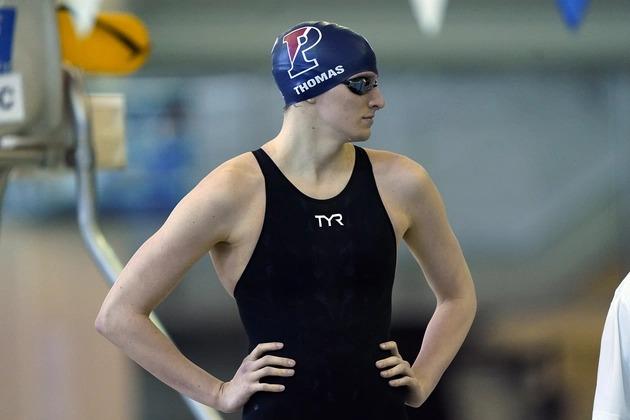In a moment that sent shockwaves across the global sports community, Lia Thomas unleashed an explosive statement targeting World Aquatics, accusing the federation of hypocrisy, cowardice, and political manipulation in its new transgender athlete policy.Her fiery words — “Putting forward an impossible condition as a bargaining chip — a bunch of Trump-bootlicking cowards” — instantly dominated headlines. Millions across social media reacted within minutes, igniting an all-out war between supporters and critics of the controversial swimmer.

The dramatic confrontation began after World Aquatics issued a new eligibility framework effectively banning transgender women from elite female competition unless they transitioned before age twelve — a restriction that Thomas slammed as “scientifically absurd and politically motivated.”
In a bold move, Lia Thomas appeared live on a popular podcast, laughing defiantly as she described the federation’s ruling as “a desperate attempt to appease far-right conservatives rather than uphold fairness or inclusivity.” The tension escalated instantly.
Her confident, almost triumphant laughter quickly went viral. Viewers described it as “a sound of rebellion” — until everything changed. Minutes later, World Aquatics released a counterstatement that blindsided the athlete and left her momentarily speechless.
The federation’s message was sharp, claiming that Thomas’s comments “disrespect the integrity of biological competition” and suggesting that her eligibility case “undermines the principles of women’s sport.” Those words hit like a thunderclap.
Witnesses in the studio recalled the exact moment the statement reached Thomas. Her expression froze. The confident smile vanished. Then, in a sudden burst of fury, she shouted, “How dare they weaponize womanhood against me?” The room fell silent.
The shocking video instantly flooded Twitter, TikTok, and Reddit. Hashtags like #LiaVsWorldAquatics, #TransAthleteRights, and #SportsEqualityNow began trending worldwide. Comment sections exploded with both outrage and admiration.
Some fans hailed Lia as a symbol of courage standing against institutional discrimination. Others, however, criticized her words as “reckless” and “deeply disrespectful.” The internet had officially turned the moment into a global spectacle.
Inside World Aquatics headquarters, anonymous sources reported “chaotic emergency meetings” as public relations teams scrambled to contain the backlash. The federation’s credibility was under siege, and the situation only grew more volatile by the hour.
Political figures soon joined the fray. U.S. lawmakers and European sports officials weighed in, further polarizing the debate. One congresswoman tweeted, “Lia Thomas is right — this isn’t about fairness; it’s about fear.” Another fired back, calling it “a delusional publicity stunt.”
Amid the chaos, sports analysts dissected every second of the viral clip. Many observed that Thomas’s initial laughter symbolized empowerment, while her sudden rage captured the exhaustion of years spent fighting systemic exclusion.
Psychologists also chimed in, noting that public humiliation and institutional rejection can trigger intense emotional responses. “What we witnessed was not arrogance,” one expert said. “It was the raw pain of being invalidated by the system.”

Meanwhile, World Aquatics stood firm. In an official press release, the organization doubled down, asserting that “female categories must remain protected for biological women” and warning athletes that further “defamatory statements” could result in sanctions.
Lia’s legal team quickly responded with a blistering statement of their own, threatening a lawsuit and accusing the federation of violating human rights standards set by the International Olympic Committee. The standoff intensified overnight.
By the next morning, international media had turned the story into a full-blown political drama. Outlets from London to Los Angeles splashed Lia Thomas’s quote across their front pages: “A bunch of Trump-bootlicking cowards.”
Public opinion split down the middle. Supporters flooded comment sections with encouragement, calling her “a revolutionary voice for modern sports.” Detractors accused her of arrogance, claiming she was “destroying women’s competition for personal gain.”
Even fellow athletes entered the arena. Some issued public messages of solidarity, while others distanced themselves entirely, afraid of being caught in the controversy. The sports world had never looked so divided.
Behind the scenes, insiders revealed that World Aquatics had been under immense pressure from sponsors and conservative lobbying groups to tighten eligibility rules. Lia’s accusation of political influence suddenly seemed far less far-fetched.
For Lia Thomas, the issue had always been bigger than medals or titles. “I’m fighting for a future where nobody has to apologize for existing,” she told one interviewer. “That’s what terrifies them — not my performance, but my presence.”
Her words resonated deeply across the LGBTQ+ community, sparking rallies and online campaigns calling for “real inclusion in sports.” Protesters even gathered outside World Aquatics’ headquarters with banners reading “Equality Can’t Be Negotiated.”
However, the controversy showed no signs of fading. Conservative commentators seized on the story, framing Lia’s behavior as “evidence of entitlement and narcissism,” while progressive outlets hailed it as a “historic act of defiance.”

Hours later, a visibly calmer Lia reappeared on Instagram Live, addressing her supporters directly. “They can twist my words all they want,” she said. “But history will remember who stood on the right side of justice.”
Her post drew over two million views in under twelve hours, turning the scandal into a global cultural flashpoint. Every news cycle seemed to revolve around the same question: Is the world ready to accept full gender inclusion in elite sports?
For now, both sides remain locked in a bitter war of statements and accusations. Yet, no one can deny that Lia Thomas has forced an uncomfortable but necessary conversation into the public arena — one that sports authorities can no longer ignore.
Love her or hate her, Lia Thomas has once again proven she is more than just a swimmer. She’s a lightning rod for change — a defiant voice challenging the institutions that would rather silence her than evolve.
And as for that fateful moment when laughter turned into fury — it may well become the defining image of an athlete who refuses to back down, no matter how powerful the opposition may be.